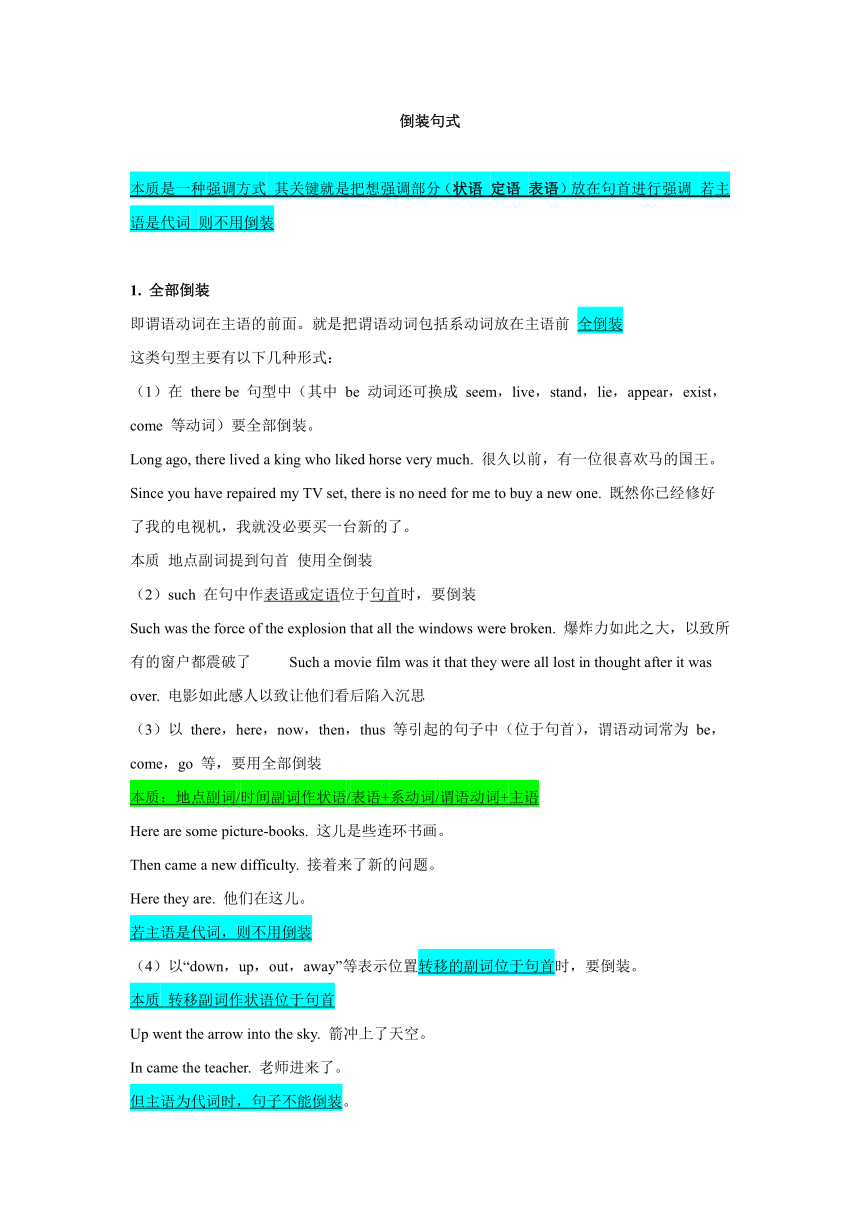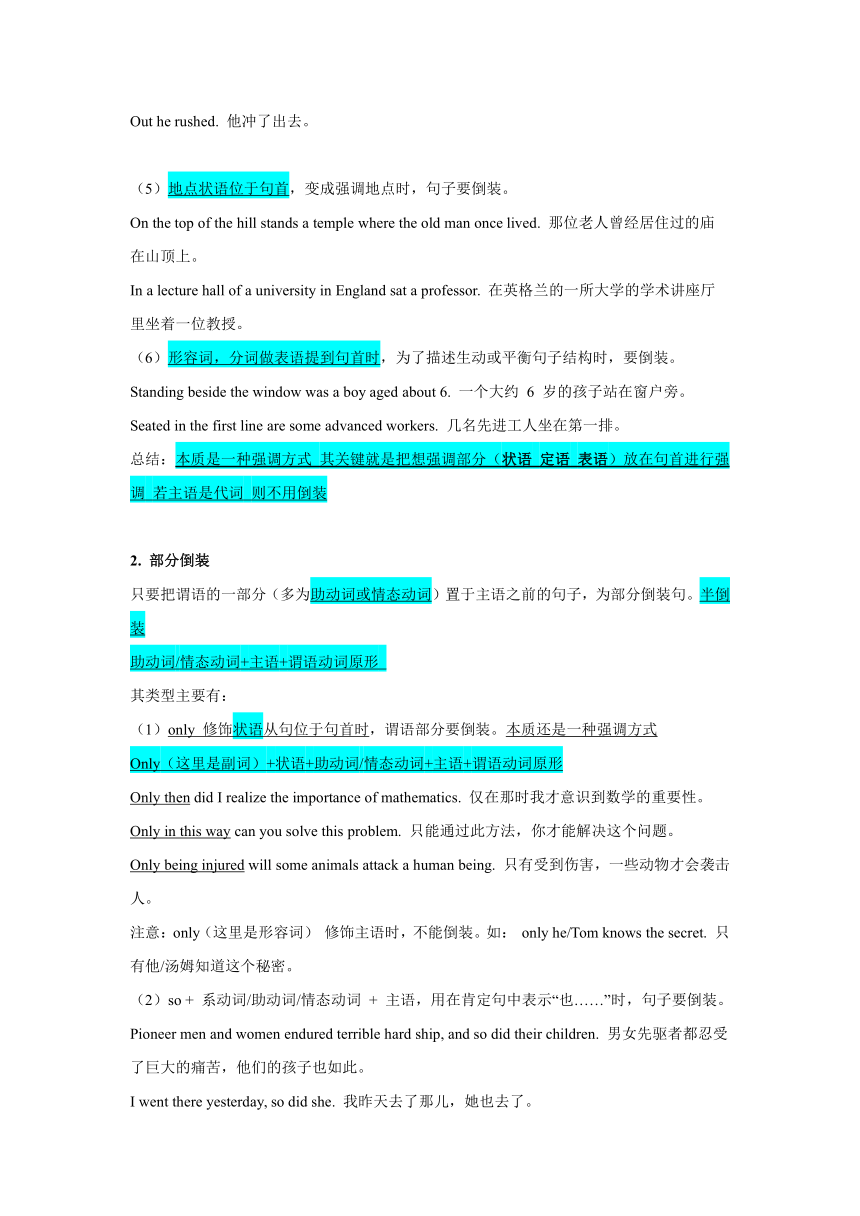2024届高考英语语法专题讲义之倒装句式篇讲义
文档属性
| 名称 | 2024届高考英语语法专题讲义之倒装句式篇讲义 |

|
|
| 格式 | docx | ||
| 文件大小 | 84.2KB | ||
| 资源类型 | 教案 | ||
| 版本资源 | 通用版 | ||
| 科目 | 英语 | ||
| 更新时间 | 2024-01-11 19:27:03 | ||
图片预览


文档简介
倒装句式
本质是一种强调方式 其关键就是把想强调部分(状语 定语 表语)放在句首进行强调 若主语是代词 则不用倒装
全部倒装
即谓语动词在主语的前面。就是把谓语动词包括系动词放在主语前 全倒装
这类句型主要有以下几种形式:
(1)在 there be 句型中(其中 be 动词还可换成 seem,live,stand,lie,appear,exist,come 等动词)要全部倒装。
Long ago, there lived a king who liked horse very much. 很久以前,有一位很喜欢马的国王。
Since you have repaired my TV set, there is no need for me to buy a new one. 既然你已经修好了我的电视机,我就没必要买一台新的了。
本质 地点副词提到句首 使用全倒装
(2)such 在句中作表语或定语位于句首时,要倒装
Such was the force of the explosion that all the windows were broken. 爆炸力如此之大,以致所有的窗户都震破了 Such a movie film was it that they were all lost in thought after it was over. 电影如此感人以致让他们看后陷入沉思
以 there,here,now,then,thus 等引起的句子中(位于句首),谓语动词常为 be,come,go 等,要用全部倒装
本质:地点副词/时间副词作状语/表语+系动词/谓语动词+主语
Here are some picture-books. 这儿是些连环书画。
Then came a new difficulty. 接着来了新的问题。
Here they are. 他们在这儿。
若主语是代词,则不用倒装
以“down,up,out,away”等表示位置转移的副词位于句首时,要倒装。
本质 转移副词作状语位于句首
Up went the arrow into the sky. 箭冲上了天空。
In came the teacher. 老师进来了。
但主语为代词时,句子不能倒装。
Out he rushed. 他冲了出去。
(5)地点状语位于句首,变成强调地点时,句子要倒装。
On the top of the hill stands a temple where the old man once lived. 那位老人曾经居住过的庙在山顶上。
In a lecture hall of a university in England sat a professor. 在英格兰的一所大学的学术讲座厅里坐着一位教授。
(6)形容词,分词做表语提到句首时,为了描述生动或平衡句子结构时,要倒装。
Standing beside the window was a boy aged about 6. 一个大约 6 岁的孩子站在窗户旁。
Seated in the first line are some advanced workers. 几名先进工人坐在第一排。
总结:本质是一种强调方式 其关键就是把想强调部分(状语 定语 表语)放在句首进行强调 若主语是代词 则不用倒装
部分倒装
只要把谓语的一部分(多为助动词或情态动词)置于主语之前的句子,为部分倒装句。半倒装
助动词/情态动词+主语+谓语动词原形
其类型主要有:
only 修饰状语从句位于句首时,谓语部分要倒装。本质还是一种强调方式
Only(这里是副词)+状语+助动词/情态动词+主语+谓语动词原形
Only then did I realize the importance of mathematics. 仅在那时我才意识到数学的重要性。
Only in this way can you solve this problem. 只能通过此方法,你才能解决这个问题。
Only being injured will some animals attack a human being. 只有受到伤害,一些动物才会袭击人。
注意:only(这里是形容词) 修饰主语时,不能倒装。如: only he/Tom knows the secret. 只有他/汤姆知道这个秘密。
(2)so + 系动词/助动词/情态动词 + 主语,用在肯定句中表示“也……”时,句子要倒装。
Pioneer men and women endured terrible hard ship, and so did their children. 男女先驱者都忍受了巨大的痛苦,他们的孩子也如此。
I went there yesterday, so did she. 我昨天去了那儿,她也去了。
总结:当同一个动作或情况也适用另一人或物,也就是前后主语不一致,用so+助动词/情态动词+主语来强调
即后面主语和前面主语动作行为或状况是同一个时,后面用so 来强调
注意:
若两个动词的形式不一样时,就得用 so it is with...,或 so it is the case with...
如: —Jane is a good student and works hard. 简是一个好学生,学习很努力。
—So it is with Tom. 汤姆也一样。
若两个主语一致时,则表示强调,不能倒装,此时 so 表示“的确如此”。如:
—It was cold yesterday. 昨天很冷。
—So it was. 的确如此。
as 有时也有类似的用法。如:
Our eating habits have changed, as has our way of life. 我们的饮食习惯发生了变化,正如我们的生活方式一样。
(3)neither,nor 用于否定句表示“也不”时,要倒装。如:
Tom doesn’t like bananas, neither/nor do I. 汤姆不喜欢香蕉,我也不要喜欢。
If you don’t go to the concert tonight, neither/nor will I. 如果你今晚不去听音乐会,我也不去。
—I don’t think I can walk any further.
—Neither can I! Let’s stop here for a rest.
(4)否定副词或短语置于句首时,要倒装。这样的副词有:never,no,hardly,scarcely,barely,seldom,
little,not,nowhere,rarely,in no time,in no case,under/in no circumstances 等。一种强调方式
本质 就是把这些否定词要否定的部分置于句首进行强调
Not a single mistake did he make. 他没犯一点错误。
Never before have I seen such a moving film. 我以前从未看过这么动人的电影。
(5)几个复合句的倒装:
1)not…until(直到……才……),如:
Not until he returned did we have supper.
We did not have supper until he returned
no sooner…than…/hardly…when/scarcely…when(一……就……)
No sooner had the bell rung than the teacher came in. 铃声一响,老师就进来了。
3)not only…but also…(不但……而且……),
Not only was he forced to stay home, but also he had to do his homework. 他不仅被强制待在家,还得完成他的家庭作业
He wasn not only forced to stay home, but also he had to do his homework.
4)so…that…(如此……以致……)
So clearly does he speak that we all understand what he says. 他说得很清楚以至于我们都能理解他说的。
He speaks so clearly that we all understand what he says.
neither…nor…(既不……也不……)
Neither has he called on her, nor will he do so. 他没有拜访她,并且将来也不拜访她。
6)动词/名词/形容词/副词/不定代词 + as 或 though + 主语 + 谓语作让步状语(从句)的倒装。仿倒
所谓仿倒 就是把要强调部分置于句首 其他部分不变 即要强调部分+主语 +谓语
(名词)Famer as he is, he knows a lot.
(动词)Object as you may, I will go.
(副词)Hard as/though she had worked, she failed the exam.
(形容词)Poor as he may be, he lives a happy life.
(代词)Much as I told you, you didn’t listen.
7)the more…the more…(越……就越……) 仿倒
The more you learn, the more equipped for life you are.
宾 主 谓 系 状 主 系
The harder you work, the greater progress you’ll make.
8)whatever,however 引导让步状语从句强调形容词副词时,句子要倒装。 仿倒
However hard he tried, he could hardly avoid making mistakes in his homework.
Whatever I gave him, he refused.
直宾 主 谓 间宾 主 谓
No matter how many difficulties you meet with, you should try to overcome them.
状 定 宾 主 谓
3. 其他形式的倒装
(1)虚拟语气中,省略 if,把 were/should/had 提到句首。如:
Had it not been for the free tickets, I would not have gone to the film so often.
=If it had not been for the free tickets, I would not have gone to the film so often.
Should it rain tomorrow, we would have to put off the visit to the Great Wall.
=If it should rain tomorrow, we would have to put off the visit to the Great Wall.
(2)表示祝愿的语句
May you succeed! Long live the friendship between us!
(3)疑问句和感叹句中
“Who is it ” said/asked my mother.
“Who is it ” the teacher asked us. What a beautiful day it is!
本质是一种强调方式 其关键就是把想强调部分(状语 定语 表语)放在句首进行强调 若主语是代词 则不用倒装
全部倒装
即谓语动词在主语的前面。就是把谓语动词包括系动词放在主语前 全倒装
这类句型主要有以下几种形式:
(1)在 there be 句型中(其中 be 动词还可换成 seem,live,stand,lie,appear,exist,come 等动词)要全部倒装。
Long ago, there lived a king who liked horse very much. 很久以前,有一位很喜欢马的国王。
Since you have repaired my TV set, there is no need for me to buy a new one. 既然你已经修好了我的电视机,我就没必要买一台新的了。
本质 地点副词提到句首 使用全倒装
(2)such 在句中作表语或定语位于句首时,要倒装
Such was the force of the explosion that all the windows were broken. 爆炸力如此之大,以致所有的窗户都震破了 Such a movie film was it that they were all lost in thought after it was over. 电影如此感人以致让他们看后陷入沉思
以 there,here,now,then,thus 等引起的句子中(位于句首),谓语动词常为 be,come,go 等,要用全部倒装
本质:地点副词/时间副词作状语/表语+系动词/谓语动词+主语
Here are some picture-books. 这儿是些连环书画。
Then came a new difficulty. 接着来了新的问题。
Here they are. 他们在这儿。
若主语是代词,则不用倒装
以“down,up,out,away”等表示位置转移的副词位于句首时,要倒装。
本质 转移副词作状语位于句首
Up went the arrow into the sky. 箭冲上了天空。
In came the teacher. 老师进来了。
但主语为代词时,句子不能倒装。
Out he rushed. 他冲了出去。
(5)地点状语位于句首,变成强调地点时,句子要倒装。
On the top of the hill stands a temple where the old man once lived. 那位老人曾经居住过的庙在山顶上。
In a lecture hall of a university in England sat a professor. 在英格兰的一所大学的学术讲座厅里坐着一位教授。
(6)形容词,分词做表语提到句首时,为了描述生动或平衡句子结构时,要倒装。
Standing beside the window was a boy aged about 6. 一个大约 6 岁的孩子站在窗户旁。
Seated in the first line are some advanced workers. 几名先进工人坐在第一排。
总结:本质是一种强调方式 其关键就是把想强调部分(状语 定语 表语)放在句首进行强调 若主语是代词 则不用倒装
部分倒装
只要把谓语的一部分(多为助动词或情态动词)置于主语之前的句子,为部分倒装句。半倒装
助动词/情态动词+主语+谓语动词原形
其类型主要有:
only 修饰状语从句位于句首时,谓语部分要倒装。本质还是一种强调方式
Only(这里是副词)+状语+助动词/情态动词+主语+谓语动词原形
Only then did I realize the importance of mathematics. 仅在那时我才意识到数学的重要性。
Only in this way can you solve this problem. 只能通过此方法,你才能解决这个问题。
Only being injured will some animals attack a human being. 只有受到伤害,一些动物才会袭击人。
注意:only(这里是形容词) 修饰主语时,不能倒装。如: only he/Tom knows the secret. 只有他/汤姆知道这个秘密。
(2)so + 系动词/助动词/情态动词 + 主语,用在肯定句中表示“也……”时,句子要倒装。
Pioneer men and women endured terrible hard ship, and so did their children. 男女先驱者都忍受了巨大的痛苦,他们的孩子也如此。
I went there yesterday, so did she. 我昨天去了那儿,她也去了。
总结:当同一个动作或情况也适用另一人或物,也就是前后主语不一致,用so+助动词/情态动词+主语来强调
即后面主语和前面主语动作行为或状况是同一个时,后面用so 来强调
注意:
若两个动词的形式不一样时,就得用 so it is with...,或 so it is the case with...
如: —Jane is a good student and works hard. 简是一个好学生,学习很努力。
—So it is with Tom. 汤姆也一样。
若两个主语一致时,则表示强调,不能倒装,此时 so 表示“的确如此”。如:
—It was cold yesterday. 昨天很冷。
—So it was. 的确如此。
as 有时也有类似的用法。如:
Our eating habits have changed, as has our way of life. 我们的饮食习惯发生了变化,正如我们的生活方式一样。
(3)neither,nor 用于否定句表示“也不”时,要倒装。如:
Tom doesn’t like bananas, neither/nor do I. 汤姆不喜欢香蕉,我也不要喜欢。
If you don’t go to the concert tonight, neither/nor will I. 如果你今晚不去听音乐会,我也不去。
—I don’t think I can walk any further.
—Neither can I! Let’s stop here for a rest.
(4)否定副词或短语置于句首时,要倒装。这样的副词有:never,no,hardly,scarcely,barely,seldom,
little,not,nowhere,rarely,in no time,in no case,under/in no circumstances 等。一种强调方式
本质 就是把这些否定词要否定的部分置于句首进行强调
Not a single mistake did he make. 他没犯一点错误。
Never before have I seen such a moving film. 我以前从未看过这么动人的电影。
(5)几个复合句的倒装:
1)not…until(直到……才……),如:
Not until he returned did we have supper.
We did not have supper until he returned
no sooner…than…/hardly…when/scarcely…when(一……就……)
No sooner had the bell rung than the teacher came in. 铃声一响,老师就进来了。
3)not only…but also…(不但……而且……),
Not only was he forced to stay home, but also he had to do his homework. 他不仅被强制待在家,还得完成他的家庭作业
He wasn not only forced to stay home, but also he had to do his homework.
4)so…that…(如此……以致……)
So clearly does he speak that we all understand what he says. 他说得很清楚以至于我们都能理解他说的。
He speaks so clearly that we all understand what he says.
neither…nor…(既不……也不……)
Neither has he called on her, nor will he do so. 他没有拜访她,并且将来也不拜访她。
6)动词/名词/形容词/副词/不定代词 + as 或 though + 主语 + 谓语作让步状语(从句)的倒装。仿倒
所谓仿倒 就是把要强调部分置于句首 其他部分不变 即要强调部分+主语 +谓语
(名词)Famer as he is, he knows a lot.
(动词)Object as you may, I will go.
(副词)Hard as/though she had worked, she failed the exam.
(形容词)Poor as he may be, he lives a happy life.
(代词)Much as I told you, you didn’t listen.
7)the more…the more…(越……就越……) 仿倒
The more you learn, the more equipped for life you are.
宾 主 谓 系 状 主 系
The harder you work, the greater progress you’ll make.
8)whatever,however 引导让步状语从句强调形容词副词时,句子要倒装。 仿倒
However hard he tried, he could hardly avoid making mistakes in his homework.
Whatever I gave him, he refused.
直宾 主 谓 间宾 主 谓
No matter how many difficulties you meet with, you should try to overcome them.
状 定 宾 主 谓
3. 其他形式的倒装
(1)虚拟语气中,省略 if,把 were/should/had 提到句首。如:
Had it not been for the free tickets, I would not have gone to the film so often.
=If it had not been for the free tickets, I would not have gone to the film so often.
Should it rain tomorrow, we would have to put off the visit to the Great Wall.
=If it should rain tomorrow, we would have to put off the visit to the Great Wall.
(2)表示祝愿的语句
May you succeed! Long live the friendship between us!
(3)疑问句和感叹句中
“Who is it ” said/asked my mother.
“Who is it ” the teacher asked us. What a beautiful day it is!
